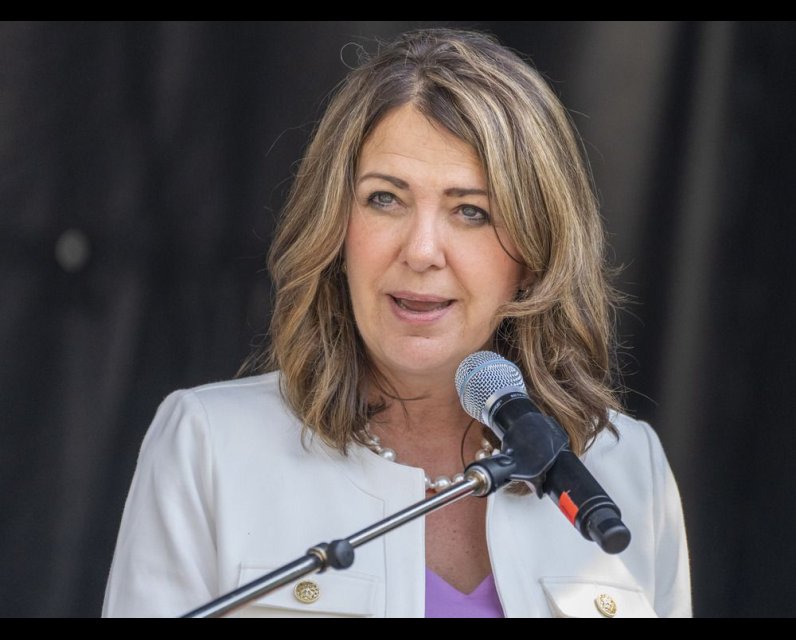Source Feed: National Post
Author: Rahim Mohamed
Publication Date: July 17, 2025 - 15:52
Danielle Smith says pulling Alberta out of supply management is worth considering
July 17, 2025

OTTAWA — Canada’s dairy and poultry supply management regime could face a major challenge from within with Alberta Premier Danielle Smith saying she could consider the province exiting the quota system.
Smith said at a town hall in Red Deer, Alta., that she found the idea of the province opting out of supply management intriguing.
“(C)reating our own Alberta version of supply management, maybe as a pathway to a market system and maybe just because it would stick our finger in the eye of Quebec … might be (something) we want to do a little consultation on,” said Smith.
Smith noted that Alberta’s share of the
Canada-wide quotas for dairy
and
egg production
allotted under supply management falls below its share of the population.
Her comments came after one of the attendees, Lee Eddy, a resident of Red Deer County, said earlier in the evening that pulling out of the system would be one way for Alberta to grab the attention of Laurentian power brokers. The town hall was being held as part of Smith’s Alberta Next panel, struck to consider tactics for enhancing Alberta’s sovereignty.
“If we really want to make the eastern politicians … change their underwear, we should remove our supply management from the Canadian system,” said Eddy.
Quebec producers hold
roughly 37 per cent
of Canada’s total milk quota, with
Ontario producers holding 32 per cent
, according to Agriculture and Agri-Foods Canada. Producers in the two provinces have exerted considerable clout over politicians, given their concentration in certain ridings.
Alberta producers hold just short of nine per cent, despite the province representing more than 11 per cent of the national population.
Eddy suggested that Alberta move first to a transitional provincial quota system and eventually to a market-based system.
Supply management has emerged as
a major trade irritant
with the U.S., further complicating already delicate cross-border trade negotiations.
U.S. President Donald Trump singled out Canada’s restricted dairy market
in a recent letter
to Prime Minister Mark Carney, threatening to slap 35 per cent tariffs on all Canadian products on August 1.
During the recent federal election,
Carney promised to keep supply management “off the table”
in new trade negotiations with the U.S. Federal Conservative Leader Pierre Poilievre has also said
he supports supply management
.
Sylvain Charlebois, director of the Agri-Foods Analytics Lab at Dalhousie University, says that Alberta’s relative lack of skin in the dairy-quota game gives it a freer hand to take on supply management.
“I could potentially see Alberta become the quote-unquote ‘sh-t disturber’ that could actually get everyone, and politicians in particular, to think differently about supply management, instead of just (being) blindly supportive without knowing why,” said Charlebois.
He noted that dairy farmers in Alberta benefit relatively little from the existing scheme, paying up
to twice as much
as farmers in Quebec and Ontario for the same share of quota.
Charlebois said it was “absolutely possible” for Alberta to leave the federal system and set up its own dairy commission. But he said that provincial administration would come with its own challenges, such as selling Alberta dairy products elsewhere in Canada.
“Would they consider other provinces to be foreign markets? It’s hard to say,” said Charlebois.
Charlebois added that other provinces could also object to Alberta “dumping” less expensive, non-supply-managed products across provincial lines.
Alberta’s milk marketing board couldn’t be reached for comment.
Lawrence Herman, a lawyer and international trade expert based in Toronto, says that just because Alberta can unilaterally exit supply management doesn’t mean it should.
“There isn’t anything that legally requires a province to participate,” said Herman. “However, the province couldn’t change the import limits and (tariff-rate quota) system, so it’s difficult to see how it would work.”
“The better option is for the feds and the provinces to work together in phasing out the entire national (supply management) system,” he added.
Supply management in Alberta sparked a minor controversy in April, when an
egg farmer in the province
was jailed in a quota dispute with the egg marketing board.
Smith said in February
that she’d asked her agricultural minister to “start (a) conversation” about potential Canada-U.S. trade concessions relating to supply management.
The Red Deer town hall was the first of
ten scheduled in-person events
hosted by the Smith-chaired Alberta Next panel.
Supply management is not one of
the six formal topics
put up for discussion by the panel.
National Post
rmohamed@postmedia.com
Our website is the place for the latest breaking news, exclusive scoops, longreads and provocative commentary. Please bookmark nationalpost.com and sign up for our daily newsletter, Posted, here.
Experts, Ontario city councillors and a former employee of disgraced ex-councillor Rick Chiarelli told Members of Provincial Parliament on Thursday that Bill 9 is “long overdue,” but still has its flaws. Read More
July 17, 2025 - 18:47 | Robert Hiltz | Ottawa Citizen
Canada and New Zealand have reached a “mutually satisfactory” resolution to a long-running dispute over access for dairy products, the federal government said in a statement on Thursday.“This agreement, negotiated in close consultation with Canadian dairy stakeholders, will result in certain minor policy changes to Canada’s TRQ (tariff rate quotas) administration, and does not amend Canada’s market access commitments,” International Trade Minister Maninder Sidhu and Agriculture Minister Heath MacDonald said in a statement.
July 17, 2025 - 18:21 | | The Globe and Mail
Via Rail says new collective agreements have been ratified with about 2,500 unionized workers. The agreements with Unifor’s council 4000 and Local 100 cover the period from the start of this year through to the end of 2027.
July 17, 2025 - 17:58 | | The Globe and Mail


Comments
Be the first to comment